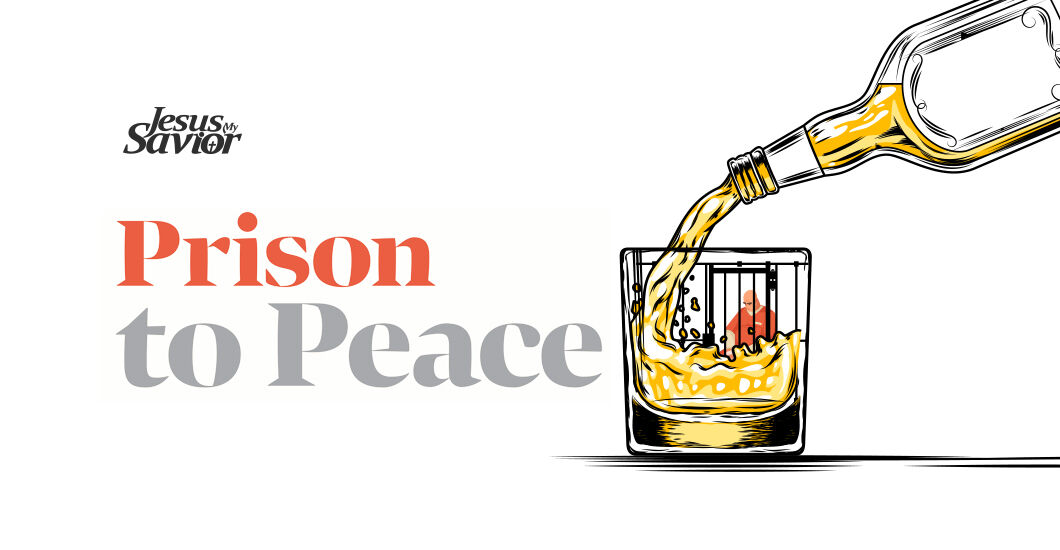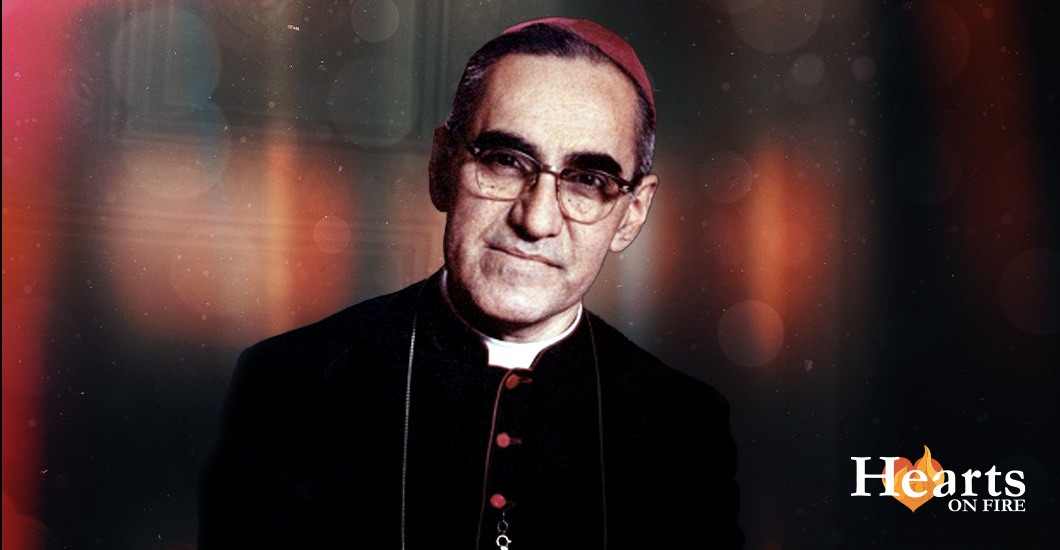Encounter
Prison to Peace
As a young drug addict, Jim Wahlberg felt despised and forgotten by the world…until God spoke to him through a special person! Read his inspiring story of redemption
I grew up Catholic, but more in the Catholic tradition than the Catholic faith. I was baptized and made my first Holy Communion. My parents sent us to church, but we didn’t go to Sunday Mass as a family. There were 9 children in my family, so anybody who was old enough to walk to church, walked to church. I remember the feeling of not belonging: the few times I went to church I would take the bulletin, and then go off to do something else. Then I stopped going altogether. Most of my siblings did the same. Nobody ever told me that Jesus died for me or that God loved me or that the Virgin Mary would intercede on my behalf. I felt I wasn’t worthy, that the people in the pews were better than me and that they were somehow judging me. I was starving for attention and acceptance.
Chasing Acceptance
When I was 8 years old, I saw the neighborhood kids drinking beer. I forced myself into their little group and convinced them to give me some. I didn’t become an alcoholic that day, but I got my first taste of acceptance and attention from the older, ‘cool’ kids. I was instantly hooked on the attention and continued to hang around the people that were drinking, doing drugs or smoking, because I found acceptance there. I spent the rest of my adolescence chasing that attention.
I grew up during the forced integration of the Boston public school system, so every year I was put on a bus and sent to school in a different neighborhood. I attended seven different schools during my first seven years of grade school, which meant each year I started over as “the new kid”. God was completely out of the picture. The only relationship I had with God was one of fear. I remember hearing over and over that God was going to get me, that He was watching, and that He was going to punish me for all the bad things I was doing.
A Lost Little Boy
On the Friday night of my last day of 7th grade, I was getting ready to go out when my dad turned to me and said, “Don’t forget, when those streetlights come on, you better be in this house, or else don’t bother to come home.” That was his threat to make sure I followed the rules. I was a 12-year-old boy hanging out with other 12-year-old kids that were all from broken homes. We were all drinking beer, smoking cigarettes, and doing drugs. Later that night, when I looked up and saw the streetlights come on, I knew I wasn’t going to make it home. Since I would be late, going home wasn’t an option, so I spent that entire summer down the street, a mile or two away from home, hanging out with my friends. We did drugs and drank alcohol every day. I was just a lost little boy.
During that summer, I was arrested a few times and became a ward of the state. It was not long before I was no longer welcome at home. I was placed in foster care, group homes and juvenile detention centers. I was homeless and completely lost and alone. The only thing that filled the emptiness was the alcohol and drugs. I would consume them, and then pass out or go to sleep. When I woke up, I would be filled with fear, and I would need more drugs and alcohol. From age 12 to 17, I was either homeless, or living in someone else’s home, or in juvenile detention.
Shackled and Broken
At 17 I got arrested again for injuring someone. I ended up being sent to the state prison on a 3-to- 5-year sentence. I found myself fighting the same inner battle as when I was younger, struggling for attention and acceptance, trying to create an illusion. I served the full five years of my sentence.
At the end of the prison term, they said I could go home, but the problem was I had no home to go to. An older brother was kind enough to say, “You can stay with me until you get on your feet.” But that would never happen. My brother picked me up at the prison to take me to see my mom. But first we stopped for a drink at a bar in my old neighborhood. I had to have a drink, before I could see my mom. It was my first legal drink, since I was now over 21. When I sat at my mother’s kitchen table, she didn’t recognize me as her child; she felt I was stranger.
I had been out of prison for approximately six months before I was arrested again for house invasion. The house I broke into belonged to a Boston police officer. In court, the officer spoke on my behalf. He said, “Look at this kid, look at his condition. Why don’t you get him help? I don’t know if prison is the right place for him.” He showed me sympathy because he could see I was a full-blown drug addict.
Suddenly I was back in prison serving a six-year sentence. I did all I could to create the illusion that I was changing my life so the police would release me early to rehabilitation. But I didn’t need rehabilitation—I needed God.
The Road to Freedom
After a few months of putting on this show of transforming my life, the prison chaplain, Father James, took notice of me and offered me a job as a custodian in his chapel. My first thought was, “I’m going to manipulate this guy”. He smoked cigarettes, drank coffee, had a phone—all things that inmates don’t have access to. So, I took the job, ulterior motives and all.
But what I didn’t know was that he also had a plan. When he approached me, his goal was to hustle me just as much as I was planning to hustle him. But his manipulation was for the glory of God. He wanted to get me back to Mass, back to the foot of the Cross. Soon after I started working in the chapel, I asked for a couple favors from Father James. When he granted my requests, it felt like my manipulation was working. One day, however, he approached me and told me he wanted me to come and clean after the Saturday Vigil Mass so that the chapel would be ready for Sunday Mass. When I offered to come after Mass, he insisted I come beforehand and stay through the Mass. He was already pushing me in the direction of faith.
A Divine Appointment
At the Mass, I felt awkward and uncomfortable. I didn’t know the prayers or when to sit or stand, so I watched what everyone else was doing to get by. Soon after, Father James officially hired me for the custodian job, and told me we would be having a special guest at the prison, “Mother Teresa.” I said, “Oh that’s amazing! Who is Mother Teresa?” Looking back, I probably didn’t even know who the President of the United States was at the time; my life revolved solely around consuming alcohol, and I rarely concerned myself with people and events outside my bubble of addiction.
Soon, Mother Teresa arrived at our prison. I remember seeing her in the distance and thinking, “Who is this person that all of the dignitaries, the warden, and the prisoners are swarming around, hanging on her every word?” Pulling closer, I noticed that her sweater and shoes looked a thousand years old. But I also noticed the peace in her eyes, and the money that filled her pockets. People often gave her money knowing she would give it to the poor.Since I worked at the chapel, I was blessed to be part of the entrance procession for the Mass with Mother Teresa. Prisoner that I was, I stood surrounded by the Cardinal, other dignitaries, and sisters from her order. The Cardinal invited Mother Teresa to sit at the altar with him, but she humbly declined, and with a reverent bow, went and knelt on the floor with some of the most dangerous criminals that I had ever met in my life.
Gazing Into God’s Eyes
As I sat on the floor, I caught her eye and I felt as though I was looking at God. Mother Teresa then ascended the altar steps and spoke words that touched me deeply, words that I had never heard before. She said that Jesus died for my sins, that I was more than the crimes I had committed, that I was a child of God, and that I mattered to God. In that moment, in that stillness, I felt as though there was no one else in the room, as though she was speaking directly to me. Her words reached a deep part of my soul.
I ran back to the chapel the next day and told Father, “I need to know more about the Jesus that she was talking about, the God and the Catholic faith that she was talking about.” Father James was delighted! He had me right at the foot of the Cross where he had wanted me ever since he offered me the custodian job. I was willing to do anything to learn more about Jesus, so Father James started preparing me for my Confirmation.
We met every week, studying the Catechism to learn about the faith. Though I was twice transferred to other prisons, I connected with the priests in those prisons as well, and was able to continue growing in my faith.
A New Beginning
A year later, it was time for me to make my formal commitment to my faith. My Confirmation was a thoughtful and intentional moment in my life. As an adult, I knew this was a major step that would set me on the road to a deeper relationship with Jesus Christ
When the time came, I called my mom to tell her I was going to be confirmed, and that I would love for her to be there. She had promised she would never visit me in prison, so she was wary. After all that I had put her through, she was wounded as a mother. But when I called again a couple of days later, she agreed to come. The Confirmation day was monumental. It was not only significant for me and my walk with Christ, but also for my relationship with my mother.
The following year, it was time for me to stand before the parole board. They said they had a letter from my mother she had written on my behalf. I knew my mother would never lie to the authorities to get me out of prison. Her letter read, “Before you stands a man of God. It’s okay, you can let him go now. He won’t be back.” Those words meant everything to me.
By the time my mother passed away, she had dementia. Over the years she had lost her ability to tell stories and her world became small. But even in those moments when she was most in the grip of dementia, she was able to recall my Confirmation, the moment when she knew I was saved.
Jesus Christ is my Savior, and I feel His presence in my life. While it requires work and effort, my relationship with Jesus is the most important one in my life. He will always love me and support me, but unless I fully engage in the relationship, I won’t know the comfort and love He longs to share with me.
It is an honor to share my journey.
Jesus Christ is our Savior.
This article is based on the testimony shared by Jim Wahlberg for the Shalom World program ‘Jesus My Savior.
Jim Wahlberg is a producer, writer, and director of films, and uses his talents to serve God and lead others to Christ. He is the author of The Big Hustle. This article is based on the testimony shared by Jim Wahlberg for the Shalom World program ‘Jesus My Savior.
Related Articles
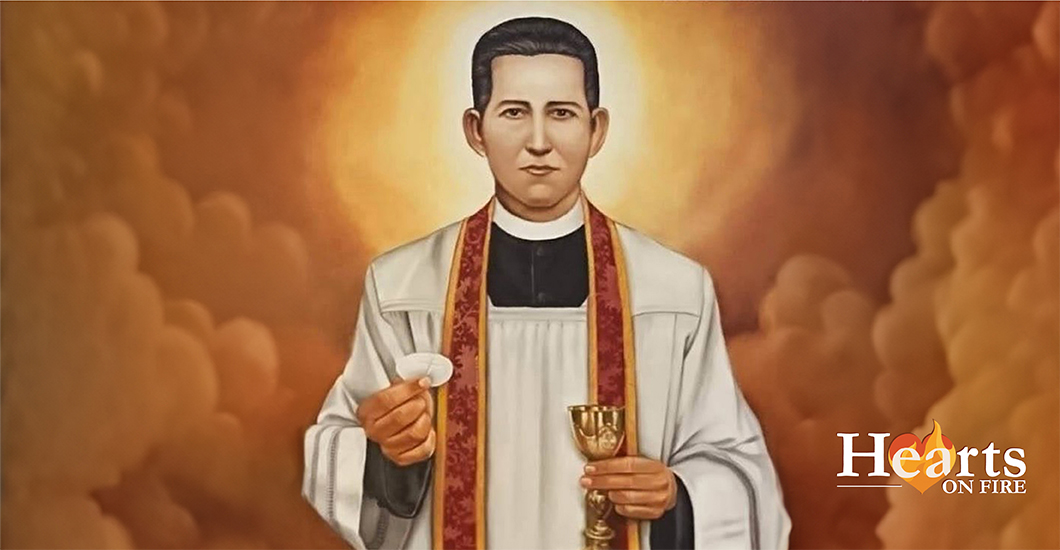
Aug 23, 2024
Encounter
Aug 23, 2024
The Mexican Revolution which began in the early 1920s, led to the persecution of the Catholic community in that country. Pedro de Jesus Maldonado-Lucero was a seminarian at that time. Once he became a priest, despite the risk, he stood with his people. He tended to his flock during a terrible epidemic, founded new apostolic groups, reestablished associations, and ignited Eucharistic piety among his parishioners.
Upon discovering his pastoral activities, the government deported him, but he managed to return and continue serving his flock, in hiding. One day, after hearing the confessions of the faithful, a gang of armed men busted his hiding place.
Father Maldonado managed to grab a reliquary with Consecrated Hosts as they forced him out. The men forced him to walk barefoot throughout the town, as a crowd of the faithful followed him. The city mayor grabbed Father Maldonado's hair and dragged him toward the city hall. He was knocked to the ground, resulting in a skull fracture that popped out his left eye. He had managed to keep his grip on the pyx until this time, but now it fell out of his hands. One of the thugs took some Holy Hosts, and as he forcefully stuffed the hosts inside the priest’s mouth, he shouted: “Eat this and see if He can save you now.”
Little did the soldier know that just the night before, during the Holy Hour, Father Maldonado had prayed that he would happily give his life for an end to the persecution ‘if only he would be allowed to take Communion before his death.’
The thugs left him for dead in a pool of his own blood. Some local women found him still breathing and rushed him to a nearby hospital. Father Pedro Maldonado was born into eternal life the next day, on the 19th anniversary of his priestly ordination. Pope John Paul II canonized this Mexican priest in 2000.
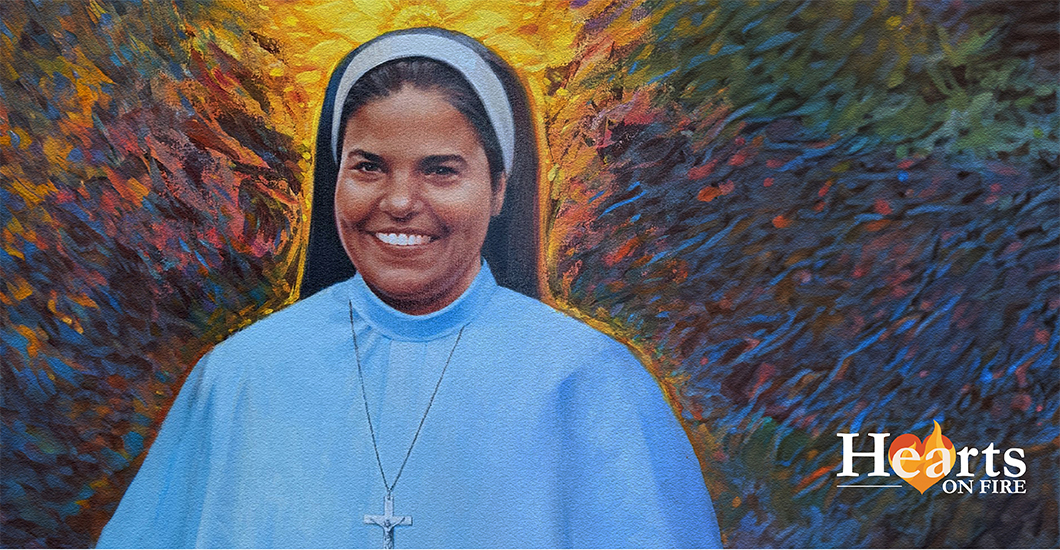
Jun 27, 2024
Enjoy
Jun 27, 2024
Rani Maria Vattalil was born on 29 January 1954 to Eleeswa and Paily Vattalil in a small village called Pulluvazhy, in Kerala, India. From a young age, she was brought up in the Christian faith, having love for the poor. She attended daily Mass and led family prayers. During the final year of high school, Rani felt the Lord calling her to consecrated life and entered the Franciscan Clarist Congregation in 1972. It was Rani Maria’s ardent desire to do missionary work in North India and serve the poor, even if it cost her life. She was sent to Madhya Pradesh (a central Indian state) and served several mission areas there.
Sister Rani Maria was given the responsibility of coordinating the social apostolate of the local diocese. She organized various educational programs for children and young people and worked relentlessly to empower the indigenous people. She understood how the poor, illiterate farmers were exploited and taken advantage of by their landlords. So, she educated them on their rights, helped them fight for justice, and spoke for those who were unjustly imprisoned. All this infuriated the upperclass landlords, who threatened her with dire consequences if she continued supporting the cause of the poor. But Rani Maria feared nothing and did not back down from her mission to 'love her neighbor.' A devious plan was then hatched by those who hated her.
On 25th February 1995, while traveling by bus, she was mercilessly stabbed 54 times by Samundhar Singh—a man hired by the landlords. She breathed her last, repeating the Holy name of Jesus. Rani Maria worked her entire life to fight for the dignity and rights of her fellow men and bore witness to the Gospel through her social activities. Sister Rani Maria’s family, following the valiant example of their daughter, forgave her murderer wholeheartedly, even inviting him to their home! This act of mercy touched him deeply; he repented of his heinous crime and became a changed man.
Sister Rani Maria was beatified by Pope Francis on 4th November 2017.
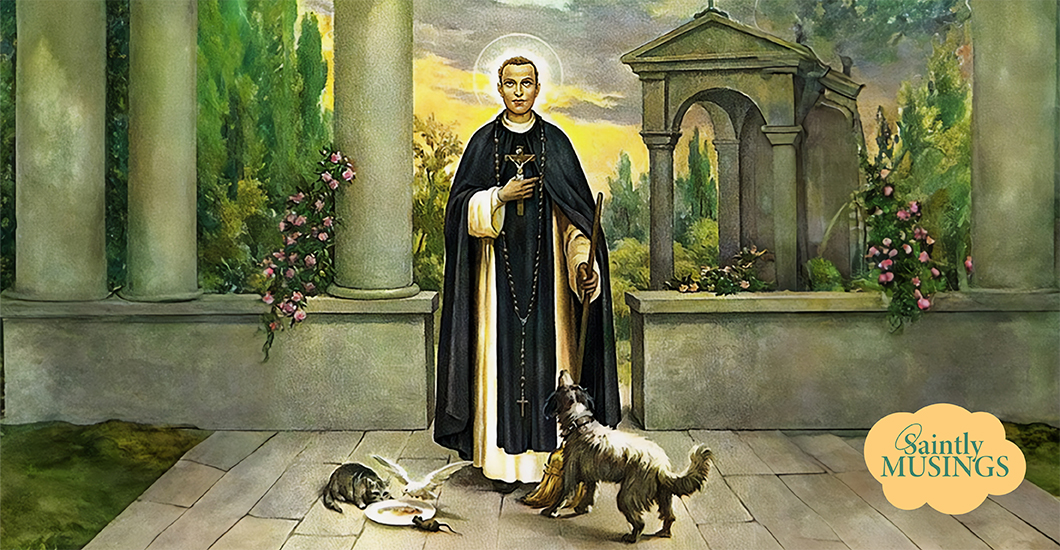
Apr 29, 2024
Encounter
Apr 29, 2024
Martin de Porres was born in 16th-century Peru; he grew up facing the stigmas of both his mixed race and illegitimacy. After a barber-medical apprenticeship in his young years, he joined the Dominicans as a ‘lay helper’ and continued his barber work in the monastery.
One day, Brother Francis Velasco Carabantes approached Martin, desiring to talk to this man whom people were already starting to believe was saintly. Martin was busy with his barber work; he absent-mindedly grabbed this novice and placed him in the barber’s chair. Brother Francis had no inclination to have his head shaved; he disliked the hairstyle that the Dominicans used.
Before he could resist, Martin had finished his job, and Brother Francis was angry beyond expression. He started to shout, calling Martin all sorts of curse words. Martin was lost in prayer, and by the time he noticed that this novice was shouting, one of the rectors had seen the commotion and was scolding Brother Francis, who was severely punished and sent away.
Martin, once he came to realize what had happened, went to the rector with all possible excuses. He begged forgiveness for this person who had verbally abused him, trying even to explain away the curse words used. Finally, he told the rector: “Everyone knows what a sinner I am.” The rector, who was aware of Martin’s saintly life, gave in to his request and forgave Brother Francis. Not satisfied with this, Brother Martin even sent fresh fruit, which was a rare delicacy in the monastery, to Brother Francis.
How many times have we rejoiced in the ‘just’ punishments that our transgressors received? Let us pray to Saint Martin for the virtue of humility, to forgive and show the other cheek, as Jesus taught us to do.

Dec 12, 2023
Encounter
Dec 12, 2023
On a scorching afternoon on the streets of Calcutta, I met a boy…
Prayer is an undeniable, central, and key part of every Christian’s life. However, Jesus emphasized two more things which clearly went hand in hand with prayer—fasting and almsgiving (Matthew 6:1-21). During the seasons of Lent and Advent, we are specifically called to commit more time and effort to all three ascetic practices. ‘More’ is the important word. Whatever season we are in, radical self-denial and giving are a continuous call for each baptized believer. Around eight years ago, God literally made me stop and think about it.
Unexpected Meeting
In 2015, I had the great privilege and blessing of fulfilling a lifelong dream to be with and serve some of the most in-need brothers and sisters worldwide in Calcutta, India, where the poor are described not only as poor but the ‘poorest of the poor.’ From the moment I landed, it was as though electricity was running through my veins. I felt such immense gratitude and love in my heart to be given this amazing opportunity to serve God with Saint Mother Teresa’s religious order, the Missionaries of Charity. The days were long but absolutely action-packed and grace-filled. Whilst I was there, I did not intend to waste a moment. After a 5 AM start to each day with an hour of prayer, followed by Holy Mass and breakfast, we set off to serve at a home for the sick, destitute, and dying adults. During the break at lunchtime, after a light meal, many of the religious brothers I was staying with took a siesta to recharge their batteries, to be ready to go again in the afternoon and on into the evening.
One day, instead of having a rest in the house, I decided to go for a walk to find a local internet café, to contact my family by email. As I turned one of the corners, I encountered a young boy aged around seven or eight years old. His face expressed a mixture of frustration, anger, sadness, hurt, and tiredness. Life had already seemed to have begun to take its toll on him. He was carrying over his shoulder the biggest transparent, heavy-duty plastic bag that I had seen in my life. It contained plastic bottles and other plastic items, and it was full.
My heart broke within me as we stood silently examining one another. My thoughts then went to what I could give this young boy. My heart sank, as I reached for my pocket, realizing that I only had a small amount of change with me to use for the internet. It added up to less than one pound in English money. As I gave it to him, looking him in the eye, his whole being seemed to change. He was so lifted and grateful, as his beautiful smile lit up his beautiful face. We shook hands, and he walked on. As I remained standing in that back street of Calcutta, I stood in awe as I knew that the Almighty God had just personally taught me such a powerful life-changing lesson through this encounter.
Reaping Blessings
I felt God had beautifully taught me in that moment that it is not the actual gift that is important but the disposition, intention, and love from the heart with which a gift is given. Saint Mother Teresa beautifully summed this up saying, “We cannot all do great things, but we can do small things with great love.” Indeed, Saint Paul said, if we give away all we have “but have not love,” we gain nothing (1 Corinthians 13:3).
Jesus describes the beauty of giving, that when we “give… it will be given to you; good measure, pressed down, shaken together, running over, will be put into your lap. For the measure you give will be the measure you get back.” (Luke 6:38). Saint Paul also reminds us that “Whatever a man sows, that he will also reap” (Gal 6:7). We do not give in order to receive, but God in His infinite wisdom and goodness blesses us personally in this life and also in the next when we step out in love (John 4:34-38). As Jesus taught us, “it is more blessed to give than to receive” (Acts 20:35).
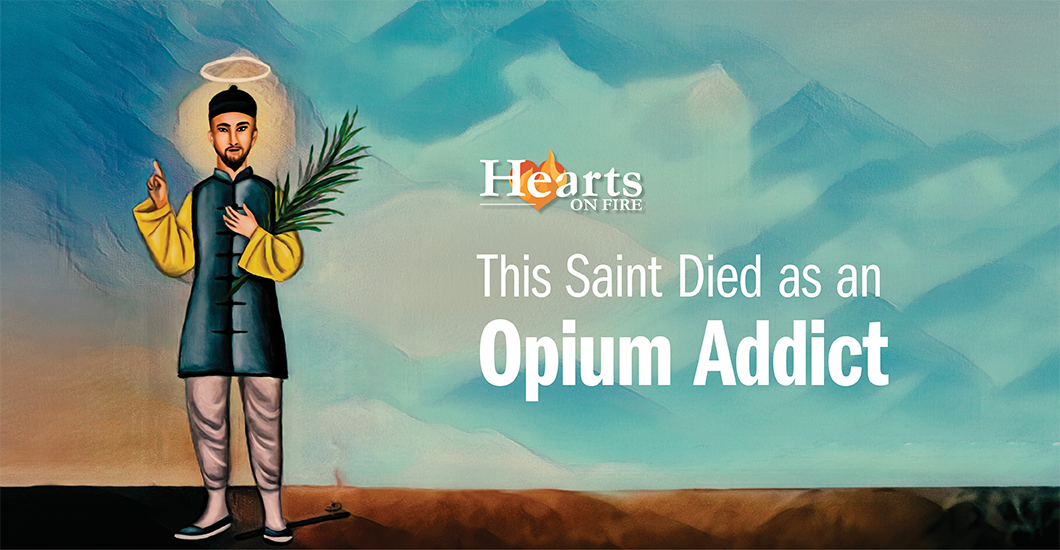
Nov 01, 2023
Engage
Nov 01, 2023
The Chinese Boxer Rebellion in the 1900s killed nearly 32,000 Chinese Christians and 200 Western Missionaries. Among these devoted Christians who gave their life for their faith, Saint Mark Ji Tianxiang stands out because, at the time of his death, he was an opium addict who had not received the Sacraments for 30 long years.
Ji was raised in a devout Christian family, and he was a respected and charitable doctor in his community. Fate be blamed, the opium he took to abate a disturbing stomach ailment took hold over him, and he was addicted to it in no time.
Though he went to frequent Confession, Ji found himself in the grips of a powerful addiction that refused to succumb to any means of resistance. His parish priest and confessor eventually told him that he could not continue to repeat the same sin in Confession anymore. Confession requires a conscious resolve to repent and sin no more, and this repeated sin, in the 19th century, was not understood as an illness. He was henceforth restricted from receiving the Sacraments, but he continued visiting the Church and stayed true to the Lord’s ways. He remained sincere to his faith because He believed in a Merciful Father.
Many assumed that he would be the first to deny the Lord when faced with the threat of persecution. But along with his son, grandchildren, and daughters-in-law, he persevered till the very end. In fact, Ji provided spiritual consolation to his fellow Christians as they were imprisoned and awaiting execution.
Stories record that as they were dragged to prison, his grandson, shaking with fear, asked him, “Grandpa, where are we going?” He calmly and jubilantly answered: “We’re going home.” He went to his death, singing the Litany of the Blessed Virgin Mary. Pope John Paul II canonized him in the year 2000.
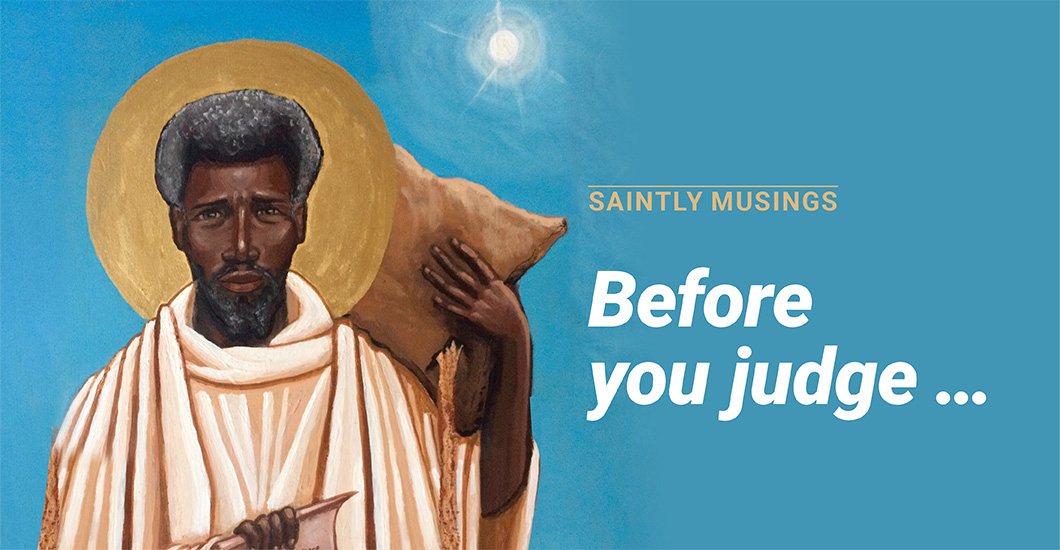
May 31, 2023
Engage
May 31, 2023
Ever heard of a robber who turned into a Saint? Moses the Black was a leader of a band of thieves who attacked, robbed, and murdered travelers in the Egyptian desert. The very mention of his name spread terror in people’s hearts. On one occasion, Moses had to hide in a monastery and was so amazed at the way he was treated by the Monks that he converted and became a monk! But the story doesn’t end there.
Once, four of the robbers of his former band descended upon the cell of Moses. He had lost none of his great physical strength, so he tied them all up. Throwing them over his shoulder, he brought them to the monastery, where he asked the Elders what to do with them. The Elders ordered that they be set free. The robbers, learning that they had chanced upon their former ringleader and that he had dealt kindly with them, followed his example: they repented and became monks. Later, when the rest of the band of robbers heard about the repentance of Moses, they also gave up their thievery and became fervent monks.
After many years of monastic struggles, Moses was ordained deacon. For another fifteen years, he continued his monastic labors. About 75 disciples gathered around the saintly Elder, who had been granted the gifts of wisdom, foresight, and power over demons by the Lord.
Once, a certain brother committed an offense in Scete, the camp of the monks. When a congregation was assembled to decide on this matter, they sent for Abba Moses, but he refused to come. Then they sent the priest of the church to him, imploring, “Come, for all the people are expecting you,” and finally, he responded to their pleas.
Taking a basket with a hole in it, he filled it with sand and carried it upon his shoulders. Those who went out to meet him asked, “What does this mean, O Father?” And he replied, “The sands are my sins, which are running down behind me, and I cannot see them. Yet, I have come here today to judge shortcomings that are not mine.” When they heard this, they set that brother free and said nothing further to him.
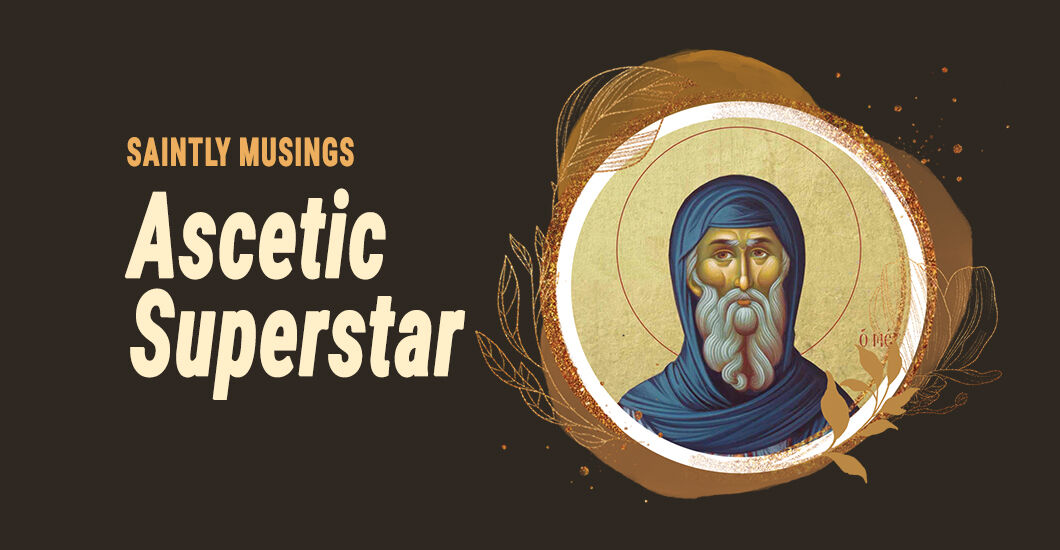
Mar 01, 2023
Engage
Mar 01, 2023
At the age of 20, Anthony lost his parents and was left with a large inheritance and the responsibility of caring for his sister. About the same time, Anthony happened to hear a reading from the Gospel of Matthew, where Jesus tells a rich young man, "If you want to be perfect, go and sell everything you have and give the money to the poor." Anthony believed he was that rich young man. Shortly after, he gave away most of his property, sold almost everything else, and kept only what he needed to care for himself and his sister. But that’s not exactly what the Lord had commanded!
Not long afterward, Anthony was at Mass once again and heard the Gospel passage, “Do not worry about tomorrow; tomorrow will take care of itself” (Matthew 6:34). Again, he knew Jesus was speaking directly to him, so he gave away even the little he had saved, entrusted his sister to the care of some holy women, and entered the desert to live a life of poverty, solitude, prayer, and mortification.
In that harsh desert landscape, the devil attacked him in countless ways saying “Think about all the good you could have done with that money you gave away!” Firm in prayer and mortification, Anthony fought off the devil and his manifestations. Many were attracted to his wisdom, and these he encouraged to seek self-denial and the hermetic life. No wonder after his death he became Saint Anthony the Great or Saint Anthony of the Desert, the father of Christian Monasticism.
Once a brother renounced the world and gave his goods to the poor, but he kept back a little for his personal expenses. He went to see Abba Antony. When he told him this, the old man said to him, "If you want to be a monk, go into the village, buy some meat, cover your naked body with it and come here like that." The brother did so, and the dogs and birds tore at his flesh. When he came back the old man asked him whether he had followed his advice. He showed him his wounded body, and Saint Antony said, "Those who renounce the world but want to keep something for themselves are torn in this way by the demons who make war on them."
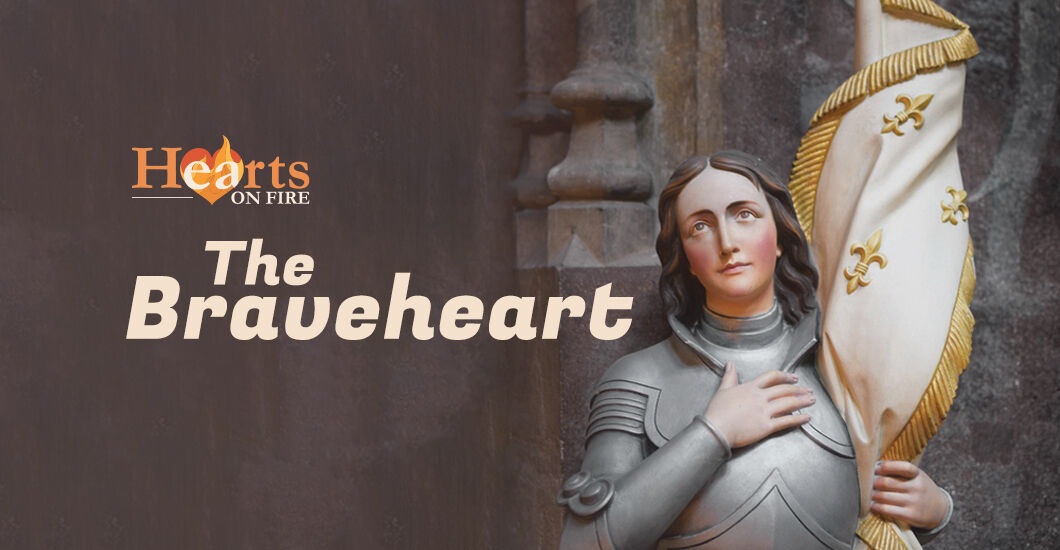
Jan 14, 2023
Engage
Jan 14, 2023
Few Saints of the Catholic Church have captured the popular imagination like Joan of Arc. Her story is depicted in paintings, sculptures, and numerous films.
Born into a peasant family in 1412, Joan grew up illiterate, but acquired a profound love for the Church and a deep faith in God from her mother. Because she loved prayer and the sacraments, her neighbors said, “She was so good that all the village loved her.” She cared for the sick and homeless, often even giving them her own bed.
By the age of thirteen, Joan began to hear the voices of Michael the Archangel, Saint Margaret of Antioch, and Saint Catherine of Alexandria. They told her she was to liberate France and ensure the French heir to the throne was installed as France’s rightful king. She won his trust by telling him details of his past only someone with divine knowledge could know. At the time, France was dominated and ruled by England.
Convinced that her “voices” came from God, Joan heroically and faithfully obeyed their instruction, despite obstacles and suffering. Prayer and contemplation remained primary in her life even as she led battles, during which she never raised the sword against an enemy
Though two years earlier a commission had “declared her to be of irreproachable life, a good Christian, possessed of the virtues of humility, honesty and simplicity”, Joan was accused of witchcraft and heresy after the English captured her, receiving no support from the very King she put on the throne. At her trial, Joan manifested her deep faith and wisdom, and despite being wrongly condemned, she never lost her faith in God or the Church. When she was burned at the stake, she proclaimed the name of Jesus while holding a crucifix to her heart, causing an observer to say, “We have burned a saint.”
Her death increased her fame and popularity. Twenty years later, a new trial declared her innocent of all her alleged crimes. After her reputation grew over the centuries to epic proportions, Joan was beatified in 1910 by Pope Pius X and canonized eleven years later by Pope Benedict XV. She is now the patron Saint of France and one of the Church’s most beloved Saints.
Joan’s obedience to God ensured France kept the Catholic faith during the Protestant Reformation while England abandoned it. France remained a solid center of Catholicism from which it would spread to northern Europe.
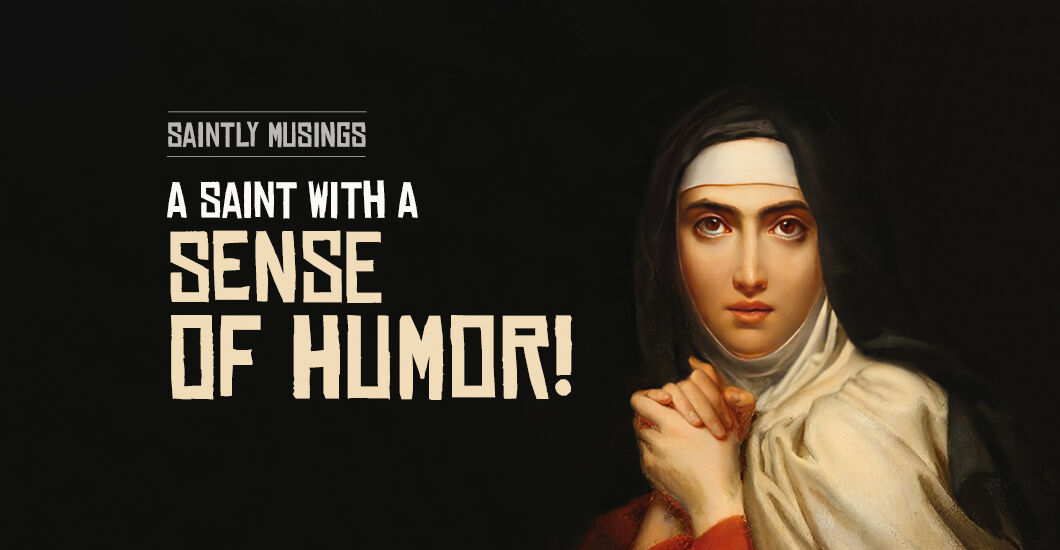
Jan 03, 2023
Engage
Jan 03, 2023
The river had swelled so high that water covered everything and all sense of where the road or footpath might be was purely a guess. With water everywhere, it seemed foolish to advance, especially in a carriage, for if anyone strayed ever so little off the road, they would perish without a doubt.
As her companions panicked, Sister Teresa encouraged them, “As we are engaged in God’s work, how could we die in a better cause?” She then led the way on foot to the convent through the fierce storm. Suddenly she slipped down an embankment and fell squarely into the mud.
Instead of complaining or cursing, the irrepressible nun, looked to the sky and quipped, “If this is how you treat your friends, no wonder you don’t have many!” The sixteenth-century Saint and Doctor of the Church, Teresa of Avila, didn’t take herself or this world too seriously and brushed off the little hardships of life with a sense of humor.
Her ability to humbly recognize her own faults and need for grace was also tinged with her refreshing humor. In her autobiography, Teresa writes, “Having virtuous and God-fearing parents would have been enough for me to be good if I were not so wicked.” Saint Teresa was also mindful of false piety and once said, “From silly devotions and sour-faced saints, good Lord, deliver us!”
A healthy and good sense of humor will keep our head straight and enable us to see the world’s true beauty. Did God say that we need to be “sour-faced” to be holy? So, if you want to become a saint, lighten up, share the joy of the Lord and laugh with your friends like Jesus did.
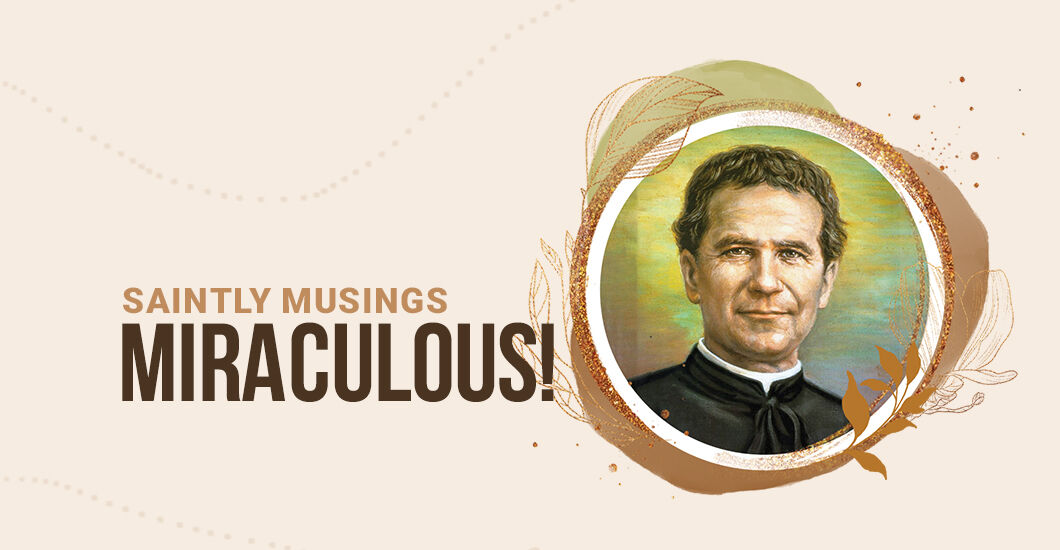
Nov 01, 2022
Enjoy
Nov 01, 2022
Maria Stardero, a 12-year-old girl, was led by her aunt into the church where dozens of boys were standing about or kneeling in prayer as they waited for Don Bosco to arrive for confessions. As she made her way to a pew, some of the boys noticed that the young girl’s eyes had no corneas and resembled white marbles.
When Don Bosco arrived, he asked the girl about her condition. She had not been born blind, she told him, but because of eye disease she had completely lost her sight two years earlier. When he inquired about medical treatment, her aunt began to sob. They had tried everything, but doctors had only one thing to say: “It is incurable!”
“Can you tell whether things are big or small?” Don Bosco asked the child.
“I can’t see anything.”
He led her to a window to see if she could perceive light, but she couldn’t.
“Would you like to see?” Don Bosco asked.
“Oh, yes! It’s the only thing I want,” said the girl, breaking down in tears.
“Will you use your eyes for the good of your soul and not to offend God?”
“I promise I will, with all my heart!”
“Good,” said Don Bosco. “You will regain your sight.”
After recourse to Mary, Help of Christians, Don Bosco recited the Hail Mary and blessed the girl. Then holding a medal of Mary Help of Christians before the girl’s eyes he asked, “For the glory of God and the Blessed Virgin, tell me what I’m holding in my hand.”
“She can’t . . .” the elderly aunt began, but Don Bosco paid no heed. After a few seconds, the child shouted, “I see!” Immediately she described the medal in great detail. But when she stretched out her hand to receive it, it rolled into a dark corner.
The aunt moved to retrieve it, but Don Bosco motioned her back.
“Let her find it to see if the Blessed Virgin has thoroughly restored her sight,” he insisted. Immediately, the girl walked to the dark corner and bent down to retrieve the tiny object. As the many witnesses looked on, awed and profoundly moved, Maria, thanked Don Bosco profusely and with sobs of great joy.
Entrust everything to Jesus in the Blessed Sacrament and to Mary, Help of Christians and you will see what miracles are! Saint John Bosco
